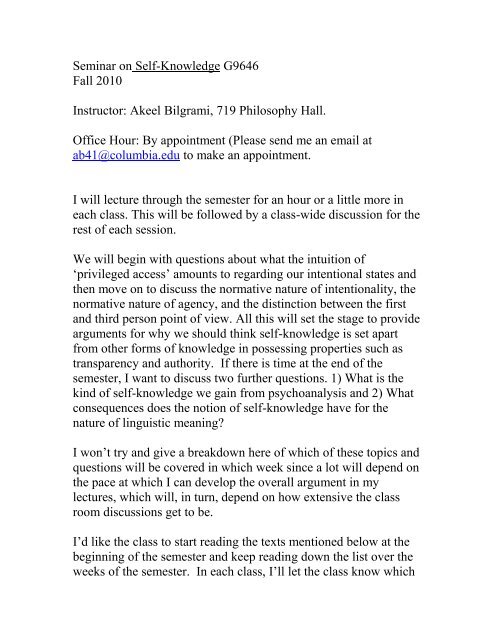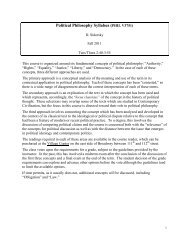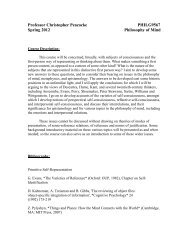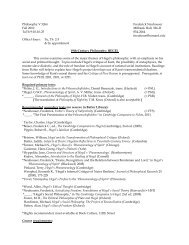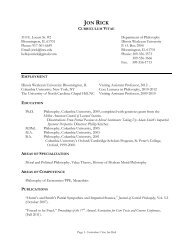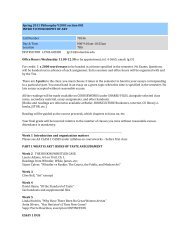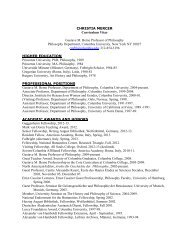Seminar on Self-Knowledge G9646 Fall 2010 Instructor: Akeel ...
Seminar on Self-Knowledge G9646 Fall 2010 Instructor: Akeel ...
Seminar on Self-Knowledge G9646 Fall 2010 Instructor: Akeel ...
Create successful ePaper yourself
Turn your PDF publications into a flip-book with our unique Google optimized e-Paper software.
<str<strong>on</strong>g>Seminar</str<strong>on</strong>g> <strong>on</strong> <strong>Self</strong>-<strong>Knowledge</strong> <strong>G9646</strong><strong>Fall</strong> <strong>2010</strong><strong>Instructor</strong>: <strong>Akeel</strong> Bilgrami, 719 Philosophy Hall.Office Hour: By appointment (Please send me an email atab41@columbia.edu to make an appointment.I will lecture through the semester for an hour or a little more ineach class. This will be followed by a class-wide discussi<strong>on</strong> for therest of each sessi<strong>on</strong>.We will begin with questi<strong>on</strong>s about what the intuiti<strong>on</strong> of„privileged access‟ amounts to regarding our intenti<strong>on</strong>al states andthen move <strong>on</strong> to discuss the normative nature of intenti<strong>on</strong>ality, thenormative nature of agency, and the distincti<strong>on</strong> between the firstand third pers<strong>on</strong> point of view. All this will set the stage to providearguments for why we should think self-knowledge is set apartfrom other forms of knowledge in possessing properties such astransparency and authority. If there is time at the end of thesemester, I want to discuss two further questi<strong>on</strong>s. 1) What is thekind of self-knowledge we gain from psychoanalysis and 2) Whatc<strong>on</strong>sequences does the noti<strong>on</strong> of self-knowledge have for thenature of linguistic meaning?I w<strong>on</strong>‟t try and give a breakdown here of which of these topics andquesti<strong>on</strong>s will be covered in which week since a lot will depend <strong>on</strong>the pace at which I can develop the overall argument in mylectures, which will, in turn, depend <strong>on</strong> how extensive the classroom discussi<strong>on</strong>s get to be.I‟d like the class to start reading the texts menti<strong>on</strong>ed below at thebeginning of the semester and keep reading down the list over theweeks of the semester. In each class, I‟ll let the class know which
eadings will be particularly useful to read for the coming week.Unlike survey style courses at the 4000 level, the focus will be <strong>on</strong>getting clear <strong>on</strong> the themes that surround the subject of selfknowledgeby looking at the relevant c<strong>on</strong>cepts and arguments,rather than <strong>on</strong> a textual exegesis of the readings. Even so, it is agood idea to have a good sense of some of the relevant literature.I have asked “Book Culture” to stock some copies of my own bookmenti<strong>on</strong>ed in the list below since I will be leaning <strong>on</strong> the materialthere in my lectures. I will ask Butler Library Reserves to keep <strong>on</strong>n<strong>on</strong>-lending reserve all of the other readings.The requirements for the class are 1) strictly regular attendance and2) <strong>on</strong>e term paper at the end of term of 15-25 pages. I will beleaving New York City <strong>on</strong> December 11 th , but will be happy tohave term papers sent to me electr<strong>on</strong>ically till as late as five daysbefore the deadline for grades to be submitted.Both graduates and undergraduates may enroll for the class.Readings:Descartes, Meditati<strong>on</strong>s.Gilbert Ryle The C<strong>on</strong>cept of Mind, (ch. <strong>on</strong> <strong>Self</strong>-<strong>Knowledge</strong>)Alis<strong>on</strong> Gopnik “How we Know Our Own Minds” Brain andBehavioural Sciences, 1993.David Armstr<strong>on</strong>g A Materialist Theory of Mind, (ch. <strong>on</strong>Introspecti<strong>on</strong>)Kripke: Wittgenstein <strong>on</strong> Rule Following and Private Language
Davids<strong>on</strong>: Essays <strong>on</strong> Acti<strong>on</strong>s and Events (“Mental Events” andany of the other essays in that volume that are <strong>on</strong> the subject ofintenti<strong>on</strong>ality and normativity.)G.E. Moore, Principia Ethica (Secti<strong>on</strong> 13 <strong>on</strong> the naturalisticfallacy)John McDowell “Functi<strong>on</strong>alism and Anomalous M<strong>on</strong>ism” inPerspectives <strong>on</strong> Language and Interpretati<strong>on</strong>, ed. E. LeporeHume, Enquiry c<strong>on</strong>cerning Human Understanding (secti<strong>on</strong> <strong>on</strong>Liberty and Necessity)P.F.Straws<strong>on</strong> “Freedom and Resentment” in Freedom andResentment and Other Essays.Crispin Wright‟s chapter in Reflecti<strong>on</strong>s <strong>on</strong> Chomsky, ed. A.GeorgeSydney Shoemaker “<strong>Self</strong> <strong>Knowledge</strong> and Inner Sense” Philosophyand Phenomenological Research, 1994Tyler Burge “Our Entitlement to <strong>Self</strong>-<strong>Knowledge</strong>” Proceedings ofthe Aristotelian Society, 1994Christopher Peacocke Being Known (ch. <strong>on</strong> <strong>Self</strong> <strong>Knowledge</strong> andIntenti<strong>on</strong>al c<strong>on</strong>tent<strong>Akeel</strong> Bilgrami <strong>Self</strong>-<strong>Knowledge</strong> and ResentmentPhilosophy and Phenomenological Research will publish asymposium with two commentaries <strong>on</strong> „<strong>Self</strong>-<strong>Knowledge</strong> andResentment‟ this <strong>Fall</strong>, with my Replies. It may be out before thesemester‟s end.


